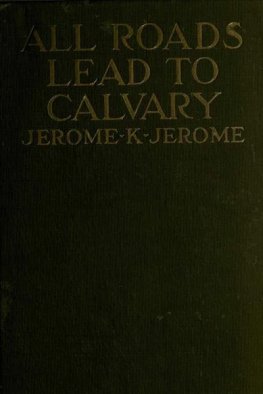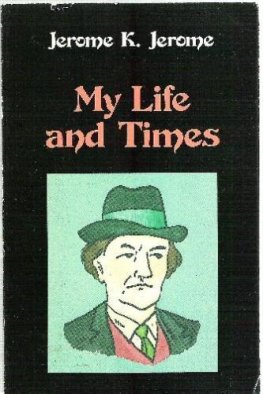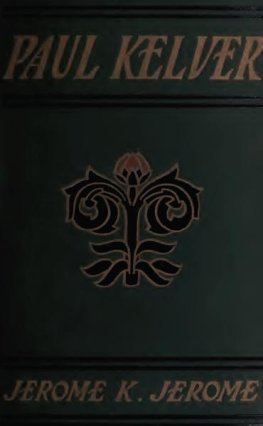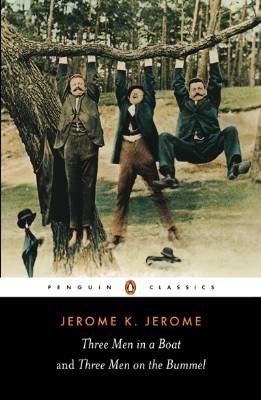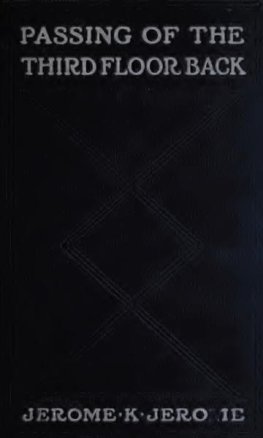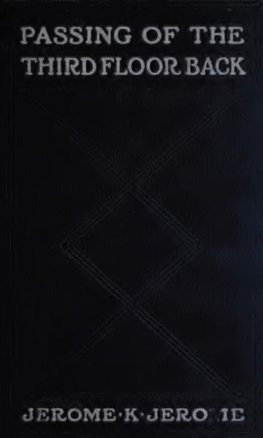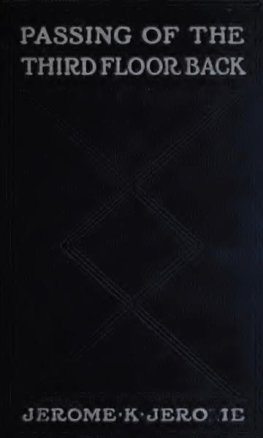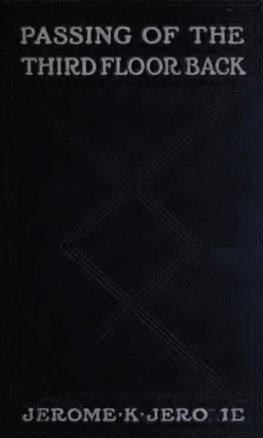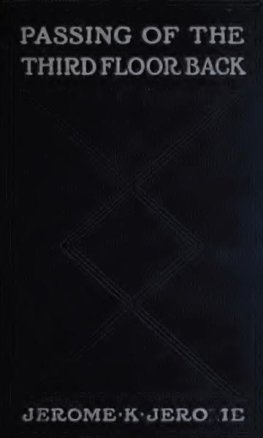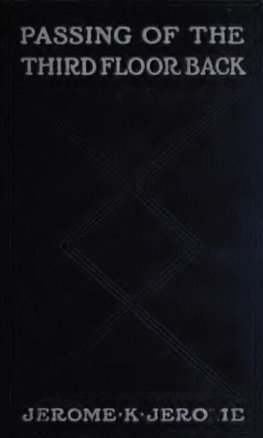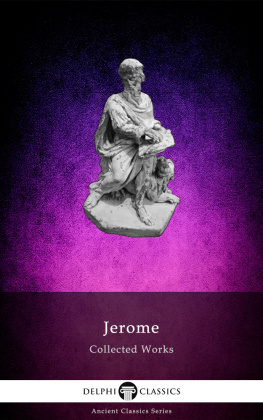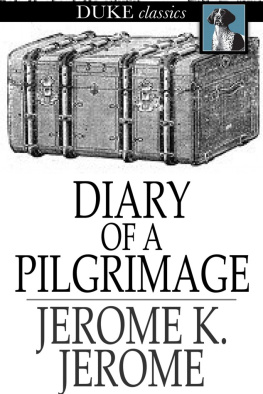Jerome Jerome - Stage-land
Here you can read online Jerome Jerome - Stage-land full text of the book (entire story) in english for free. Download pdf and epub, get meaning, cover and reviews about this ebook. genre: Prose / Humor. Description of the work, (preface) as well as reviews are available. Best literature library LitArk.com created for fans of good reading and offers a wide selection of genres:
Romance novel
Science fiction
Adventure
Detective
Science
History
Home and family
Prose
Art
Politics
Computer
Non-fiction
Religion
Business
Children
Humor
Choose a favorite category and find really read worthwhile books. Enjoy immersion in the world of imagination, feel the emotions of the characters or learn something new for yourself, make an fascinating discovery.

- Book:Stage-land
- Author:
- Genre:
- Rating:4 / 5
- Favourites:Add to favourites
- Your mark:
- 80
- 1
- 2
- 3
- 4
- 5
Stage-land: summary, description and annotation
We offer to read an annotation, description, summary or preface (depends on what the author of the book "Stage-land" wrote himself). If you haven't found the necessary information about the book — write in the comments, we will try to find it.
Stage-land — read online for free the complete book (whole text) full work
Below is the text of the book, divided by pages. System saving the place of the last page read, allows you to conveniently read the book "Stage-land" online for free, without having to search again every time where you left off. Put a bookmark, and you can go to the page where you finished reading at any time.
Font size:
Interval:
Bookmark:
Stage-land
by Jerome K. Jerome
Preface
Dedication:
TO THAT HIGHLY RESPECTABLE BUT UNNECESSARILY RETIRING INDIVIDUAL, OF WHOM WE HEAR SO MUCH BUT SEE SO LITTLE, "THE EARNEST STUDENT OF THE DRAMA,"
THIS (COMPARATIVELY) TRUTHFUL LITTLE BOOK IS LOVINGLY DEDICATED.
THE HERO
His name is George, generally speaking. "Call me George!" he says to the heroine. She calls him George (in a very low voice, because she is so young and timid). Then he is happy.
The stage hero never has any work to do. He is always hanging about and getting into trouble. His chief aim in life is to be accused of crimes he has never committed, and if he can muddle things up with a corpse in some complicated way so as to get himself reasonably mistaken for the murderer, he feels his day has not been wasted.
He has a wonderful gift of speech and a flow of language calculated to strike terror to the bravest heart. It is a grand thing to hear him bullyragging the villain.
The stage hero is always entitled to "estates," chiefly remarkable for their high state of cultivation and for the eccentric ground plan of the "manor house" upon them. The house is never more than one story high, but it makes up in green stuff over the porch what it lacks in size and convenience.
The chief drawback in connection with it, to our eyes, is that all the inhabitants of the neighboring village appear to live in the front garden, but the hero evidently thinks it rather nice of them, as it enables him to make speeches to them from the front doorstephis favorite recreation.
There is generally a public-house immediately opposite. This is handy.
These "estates" are a great anxiety to the stage hero. He is not what you would call a business man, as far as we can judge, and his attempts to manage his own property invariably land him in ruin and distraction. His "estates," however, always get taken away from him by the villain before the first act is over, and this saves him all further trouble with regard to them until the end of the play, when he gets saddled with them once more.
Not but what it must be confessed that there is much excuse for the poor fellow's general bewilderment concerning his affairs and for his legal errors and confusions generally. Stage "law" may not be quite the most fearful and wonderful mystery in the whole universe, but it's near itvery near it. We were under the impression at one time that we ourselves knew somethingjust a littleabout statutory and common law, but after paying attention to the legal points of one or two plays we found that we were mere children at it.
We thought we would not be beaten, and we determined to get to the bottom of stage law and to understand it; but after some six months' effort our brain (a singularly fine one) began to soften, and we abandoned the study, believing it would come cheaper in the end to offer a suitable reward, of about 50,000 pounds or 60,000 pounds, say, to any one who would explain it to us.
The reward has remained unclaimed to the present day and is still open.
One gentleman did come to our assistance a little while ago, but his explanations only made the matter more confusing to our minds than it was before. He was surprised at what he called our density, and said the thing was all clear and simple to him. But we discovered afterward that he was an escaped lunatic.
The only points of stage "law" on which we are at all clear are as follows:
That if a man dies without leaving a will, then all his property goes to the nearest villain.
But if a man dies and leaves a will, then all his property goes to whoever can get possession of that will.
That the accidental loss of the three-and-sixpenny copy of a marriage certificate annuls the marriage.
That the evidence of one prejudiced witness of shady antecedents is quite sufficient to convict the most stainless and irreproachable gentleman of crimes for the committal of which he could have had no possible motive.
But that this evidence may be rebutted years afterward, and the conviction quashed without further trial by the unsupported statement of the comic man.
That if A forges B's name to a check, then the law of the land is that B shall be sentenced to ten years' penal servitude.
That ten minutes' notice is all that is required to foreclose a mortgage.
That all trials of criminal cases take place in the front parlor of the victim's house, the villain acting as counsel, judge, and jury rolled into one, and a couple of policemen being told off to follow his instructions.
These are a few of the more salient features of stage "law" so far as we have been able to grasp it up to the present; but as fresh acts and clauses and modifications appear to be introduced for each new play, we have abandoned all hope of ever being able to really comprehend the subject.
To return to our hero, the state of the law, as above sketched, naturally confuses him, and the villain, who is the only human being who does seem to understand stage legal questions, is easily able to fleece and ruin him. The simple-minded hero signs mortgages, bills of sale, deeds of gift, and such like things, under the impression that he is playing some sort of a round game; and then when he cannot pay the interest they take his wife and children away from him and turn him adrift into the world.
Being thrown upon his own resources, he naturally starves.
He can make long speeches, he can tell you all his troubles, he can stand in the lime-light and strike attitudes, he can knock the villain down, and he can defy the police, but these requirements are not much in demand in the labor market, and as they are all he can do or cares to do, he finds earning his living a much more difficult affair than he fancied.
There is a deal too much hard work about it for him. He soon gives up trying it at all, and prefers to eke out an uncertain existence by sponging upon good-natured old Irish women and generous but weak-minded young artisans who have left their native village to follow him and enjoy the advantage of his company and conversation.
And so he drags out his life during the middle of the piece, raving at fortune, raging at humanity, and whining about his miseries until the last act.
Then he gets back those "estates" of his into his possession once again, and can go back to the village and make more moral speeches and be happy.
Moral speeches are undoubtedly his leading article, and of these, it must be owned, he has an inexhaustible stock. He is as chock-full of noble sentiments as a bladder is of wind. They are weak and watery sentiments of the sixpenny tea-meeting order. We have a dim notion that we have heard them before. The sound of them always conjures up to our mind the vision of a dull long room, full of oppressive silence, broken only by the scratching of steel pens and an occasional whispered "Give us a suck, Bill. You know I always liked you;" or a louder "Please, sir, speak to Jimmy Boggles. He's a-jogging my elbow."
The stage hero, however, evidently regards these meanderings as gems of brilliant thought, fresh from the philosophic mine.
The gallery greets them with enthusiastic approval. They are a warm-hearted people, galleryites, and they like to give a hearty welcome to old friends.
And then, too, the sentiments are so good and a British gallery is so moral. We doubt if there could be discovered on this earth any body of human beings half so moralso fond of goodness, even when it is slow and stupidso hateful of meanness in word or deedas a modern theatrical gallery.
The early Christian martyrs were sinful and worldly compared with an Adelphi gallery.
The stage hero is a very powerful man. You wouldn't think it to look at him, but you wait till the heroine cries "Help! Oh, George, save me!" or the police attempt to run him in. Then two villains, three extra hired ruffians and four detectives are about his fighting-weight.
Font size:
Interval:
Bookmark:
Similar books «Stage-land»
Look at similar books to Stage-land. We have selected literature similar in name and meaning in the hope of providing readers with more options to find new, interesting, not yet read works.
Discussion, reviews of the book Stage-land and just readers' own opinions. Leave your comments, write what you think about the work, its meaning or the main characters. Specify what exactly you liked and what you didn't like, and why you think so.

